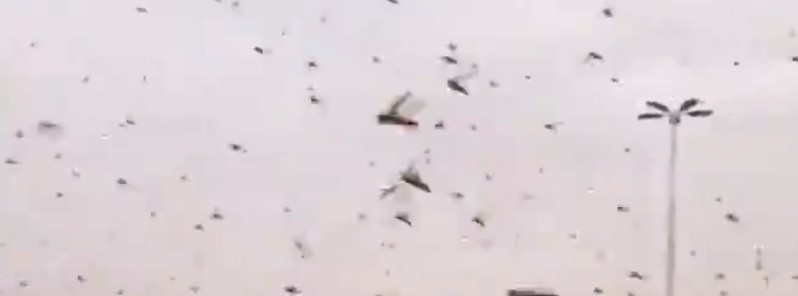Somalia declares state of emergency over new locust invasion, infestation persists in Saudi Arabia

Somalia has announced a state of emergency on Wednesday, February 4, 2021, as the nation battles a new generation of desert locust swarms that have already caused major damage to farmlands. Meanwhile, infestations are ongoing in Saudi Arabia, posing risks that any locusts that escape control could form adult groups that would likely move inland.
Somalia is facing humanitarian needs never witnessed before as the country is battling locusts, as well as flooding and the COVID-19 pandemic.
The UN Food and Agriculture Organization (FAO) initially warned that the fleet of anti-locust aircraft in Kenya and Somalia could be grounded as the funding fell short of 38 million dollars.
The intensity of the locust outbreak over the East African region has been blamed on climate change. The state of emergency declared in Somalia is in effect particularly in the southern areas.
In a statement, FAO said, "rains and winds are two of the most favorable conditions for desert locusts to multiply rapidly and spread to areas where they had been under control."
"In Somalia, hopper bands are present on the northwest coast and in the northeast where some have started to fledge and will be forming immature swarms. Intensive control operations are underway to reduce the number of new swarms that will form this month."
Swarms that develop on the northwest coast are likely to move to the plateau and adjacent areas of eastern Ethiopia, while swarms in the northeast are forecast to spread west along the plateau, where they could mature and produce another generation of breeding from mid-March onwards, especially if more rain will fall.

"A few swarms could migrate from the northeast towards southern Somalia where crop damage has been reported from previous swarms," FAO added.
Meanwhile, ongoing infestations in Saudi Arabia pose a risk of a new group of adult swarms that are likely to move inland to the spring breeding areas of the interior.
"There remains a risk that a few swarms may be present in inaccessible areas of the north, which could move to adjacent areas of southwest Saudi Arabia."
#جراد_الرس
لا إله إلا الله ولا حول ولا قوة الا بالله
أسراب كبيرة من الجراد تجتاح #الرس في هذه الأثناء
رصد @5_mayo9 https://t.co/AmYj9qI4sD pic.twitter.com/fHchkRWyBT— طقس العرب – السعودية (@ArabiaWeatherSA) February 5, 2021
#جراد_الرس
مشهد جديد لجراد الرس قبل قليل
أسراب كبيرة من الجراد تجتاح #الرس في هذه الأثناء
رصد @abosaad4466https://t.co/nVjJdbmc0r pic.twitter.com/jVD8V4n7dD— طقس العرب – السعودية (@ArabiaWeatherSA) February 5, 2021
#جراد_الرس
لا إله إلا الله ولا حول ولا قوة الا بالله #الجراد يغزو محافظة #الرس الآن بأعداد هائلة
رصد @oooo23456 https://t.co/nVjJdbmc0r pic.twitter.com/C2xMiHQDDp— طقس العرب – السعودية (@ArabiaWeatherSA) February 5, 2021
Featured image credit: Arabia Weather

Commenting rules and guidelines
We value the thoughts and opinions of our readers and welcome healthy discussions on our website. In order to maintain a respectful and positive community, we ask that all commenters follow these rules.